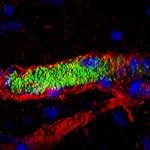Lien vers Pubmed [PMID] – 30006585
Int J Obes (Lond) 2019 Mar;43(3):556-566
BACKGROUND/OBJECTIVES: The increased prevalence of obesity has prompted great strides in our understanding of specific adipose depots and their involvement in cardio-metabolic health. However, the impact of obesity on dermal white adipose tissue (dWAT) and dermal microvascular functionality remains unclear. This study aimed to investigate the temporal changes that occur in dWAT and dermal microvascular functionality during the development of diet-induced obesity and type 2 diabetes in mice.
METHODS: Metabolic phenotyping of a murine model of hypercaloric diet (HCD)-induced obesity and type 2 diabetes was performed at three time points that reflected three distinct stages of disease development; 2 weeks of HCD-overweight-metabolically healthy, 4 weeks of HCD-obese-prediabetic and 12 weeks of HCD-obese-type 2 diabetic mice. Expansion of dWAT was characterized histologically, and changes in dermal microvascular reactivity were assessed in response to pressure and the vasodilators SNP and Ach.
RESULTS: HCD resulted in a progressive expansion of dWAT and increased expression of pro-inflammatory markers (IL1β and COX-2). Impairments in pressure-induced (PIV) and Ach-induced (endothelium-dependent) vasodilation occurred early, in overweight-metabolically healthy mice. Residual vasodilatory responses were NOS-independent but sensitive to COX inhibition. These changes were associated with reductions in NO and adiponectin bioavailability, and rescued by exogenous adiponectin or hyperinsulinemia. Obese-prediabetic mice continued to exhibit impaired Ach-dependent vasodilation but PIV appeared normalized. This normalization coincided with elevated endogenous adiponectin and insulin levels, and was sensitive to NOS, COX and PI3K, inhibition. In obese-type 2 diabetic mice, both Ach-stimulated and pressure-induced vasodilatory responses were increased through enhanced COX-2-dependent prostaglandin response.
CONCLUSIONS: We demonstrate that the development of obesity, metabolic dysfunction and type 2 diabetes, in HCD-fed mice, is accompanied by increased dermal adiposity and associated metaflammation in dWAT. Importantly, these temporal changes are also linked to disease stage-specific dermal microvascular reactivity, which may reflect adaptive mechanisms driven by metaflammation.

